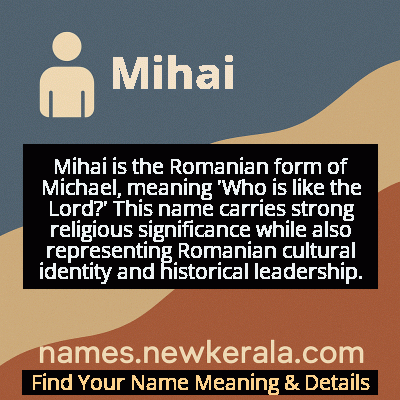Mihai Name Meaning & Details
Origin, Popularity, Numerology Analysis & Name Meaning of Mihai
Discover the origin, meaning, and cultural significance of the name MIHAI. Delve into its historical roots and explore the lasting impact it has had on communities and traditions.
Name
Mihai
Gender
Male
Origin
Romanian
Lucky Number
4
Meaning of the Name - Mihai
Mihai is the Romanian form of Michael, meaning 'Who is like the Lord?' This name carries strong religious significance while also representing Romanian cultural identity and historical leadership.
Mihai - Complete Numerology Analysis
Your Numerology Number
Based on Pythagorean Numerology System
Ruling Planet
Uranus (Rahu)
Positive Nature
Strong sense of order, loyal, practical, and disciplined.
Negative Traits
Stubborn, overly serious, rigid, and prone to feeling restricted.
Lucky Colours
Blue, gray.
Lucky Days
Saturday.
Lucky Stones
Blue sapphire.
Harmony Numbers
1, 7, 8.
Best Suited Professions
Managers, engineers, accountants, organizers.
What People Like About You
Dependability, discipline, practicality.
Famous People Named Mihai
Mihai Eminescu
Poet
National poet of Romania and most influential Romanian poet
Mihai Viteazul
Ruler
First unification of Wallachia, Moldavia, and Transylvania
Mihai Tudose
Politician
Former Prime Minister of Romania
Mihai Bălașa
Footballer
Professional footballer for Romanian national team
Name Variations & International Equivalents
Click on blue names to explore their detailed meanings. Gray names with will be available soon.
Cultural & Historical Significance
The name also carries literary prestige through Mihai Eminescu, Romania's national poet, whose works form the cornerstone of Romanian cultural heritage. This dual significance—religious devotion and national pride—makes Mihai one of the most culturally resonant names in Romanian society. Throughout history, the name has been borne by princes, intellectuals, and cultural figures who have shaped Romanian identity, creating a continuous thread connecting ancient traditions with modern national consciousness. The enduring popularity of Mihai across centuries demonstrates how naming practices can preserve and transmit cultural values from generation to generation.
Extended Personality Analysis
Individuals named Mihai are often perceived as strong-willed, principled, and protective. They tend to exhibit natural leadership qualities combined with a deep sense of responsibility toward family and community. The name's association with the archangel Michael suggests traits of courage, justice, and moral integrity—characteristics that often manifest in Mihais as a tendency to stand up for what they believe is right and protect those they care about. Many Mihais display a balanced combination of practical intelligence and emotional depth, making them reliable problem-solvers who can navigate complex situations with both logic and empathy.
These individuals typically possess a quiet confidence rather than overt arrogance, and their strength often emerges during challenging circumstances when their protective instincts and determination become most apparent. While they can be traditional in their values, they also demonstrate adaptability and resilience when facing modern challenges. The cultural expectation associated with the name often influences personality development, with many Mihais feeling a sense of duty to live up to the name's historical and spiritual significance. This can result in individuals who are conscientious, honorable, and committed to making positive contributions to their communities while maintaining personal integrity.
Modern Usage & Popularity
Mihai remains a popular and enduring name in contemporary Romania, consistently ranking among the top 50 male names in recent decades. While its peak popularity was during the mid-20th century, it maintains strong cultural relevance and is frequently chosen by parents seeking a name that balances traditional values with modern appeal. The name has seen some decline in urban areas where international names are gaining traction, but it continues to be widely used across all regions of Romania and among Romanian diaspora communities worldwide. Recent naming trends show that many parents choose Mihai as a middle name to honor family traditions while selecting more contemporary first names for their children. The name's versatility and strong cultural associations ensure it remains a respected choice that bridges generations, particularly in families with strong Romanian heritage or Orthodox Christian beliefs.
Symbolic & Spiritual Meanings
Symbolically, Mihai represents divine protection, moral strength, and national identity. The name carries the metaphorical weight of the archangel Michael's role as a protector and warrior against darkness, making it symbolic of courage and spiritual guardianship. In Romanian context, it also symbolizes unity and national pride through its association with Mihai Viteazul, representing the ideal of leadership that brings people together for common purpose. The name embodies the concept of righteous leadership—someone who defends truth and justice while maintaining humility before divine authority. Metaphorically, Mihai suggests a bridge between earthly responsibilities and spiritual values, representing individuals who navigate worldly challenges with moral compass intact. The name's enduring popularity across centuries symbolizes cultural continuity and the preservation of national identity through naming traditions, serving as a living connection to Romanian history and spiritual heritage.

